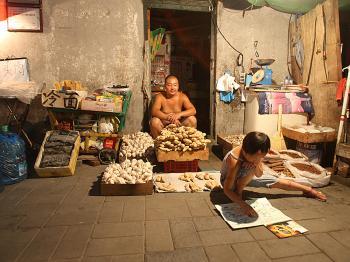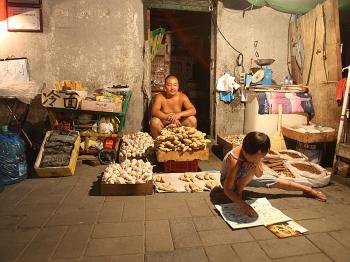Analysis
With the world’s attention focused on the Olympic spectacle unfolding in Beijing, the ruling Chinese Communist Party (CCP) sent a quiet warning last week that turbulent times may lie ahead for the Chinese economy.
From Aug. 13 to 15, the party’s main print mouthpiece, the People’s Daily newspaper, published a series of front-page editorials under the theme of “guaranteeing a sound and fast economic development this year.” But in contrast to the propitious headline, the editorials revealed concerns in the party’s ranks that China’s economy had entered “uncertain” times.
The editorials argued that the Chinese economy faces new threats from “outside factors,” including slowing demand on Chinese exports, rising fuel and raw materials costs, and soaring inflation.
“At the moment, the environment for economic and social development has become extremely complicated,” read one editorial. “Uncertain, unstable factors have been increasing in number, so the difficulty of managing at the macro level has increased.”
Another editorial said ensuring continued growth must be “the primary target and task.”
The editorials mark a rare admission from the Communist rulers—who have staked much of their party’s legitimacy on promises of continued economic growth—that a problem may loom ahead in China’s economy.
Until now, the incredible $45 billion spent on Olympic preparations and the concurrent stumbling of the Chinese stock market have been given little press, both in China and abroad.
But some commentators argue this will change, as they predict an economic fallout after the Games have come to pass.
Economists have already sounded some warning bells.
“Recent data suggested that the slowdown has taken a firmer hold of the economy and the Olympics may present some downside risks,” Citibank economist Ken Peng told the International Herald Tribune earlier this month.
Jing Ulrich, the Hong Kong-based chairman of China Equities with JPMorgan has concluded that “China’s economy is indeed slowing,” according to a recent report in Business Week.
William Mei, a business commentator for the Chinese-language New Tang Dynasty Television, has penned a series of articles on the Chinese economy and financial sectors. As early as 2002, he predicted an economic downturn in China after the Olympics.
In Mei’s argument, the problem areas in China are the real estate market, stock market, and financial systems. He lays out in detail the large debts of Chinese state-owned financial agencies. He describes the four major banks in China as being essentially bankrupt.
A major source of income for local governments, Mei says, has been selling state-owned land to investors for residential and industrial developments. The push to sell this land has accelerated the real estate bubble, he argues.
Mei believes the Chinese authorities will eventually face enough pressure over currency manipulation, intellectual-property violations, or other trade practices, that it will be forced to make changes that will uncover the holes in its banking system.
Chin-ho Hsieh agrees. CEO of Wealth Group, the Taiwan businessman believes there are three bubbles ready to burst in China: the export bubble; the housing market bubble; and the stock market bubble.
Hsieh says the real estate market peaked before the Beijing Games. In Shenzhen, there are reports that housing prices have tumbled 40 per cent. The Chinese export surplus has also declined. Meanwhile, the Shanghai Composite Index has lost 60 per cent from its peak.
Gordon Chang, author of The Coming Collapse of China, argues that an economic downturn after the Beijing Games is inevitable, and that many Chinese see it coming. He believes turbulent economic times will bring social changes, too.
Chang agrees with Mei and Hsieh that the real drama will begin after the Games are over.




